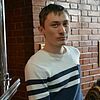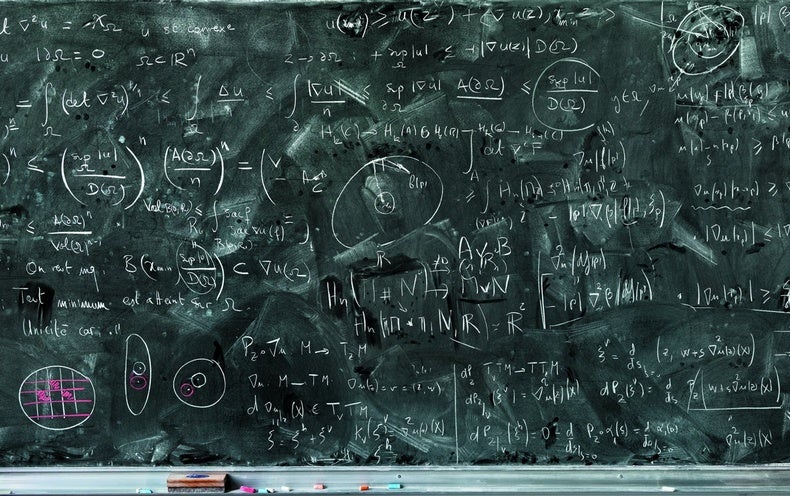#mathematics
A quotation by Von Neumann, John
If people do not believe that mathematics is simple, it is only because they do not realize how complicated life is.
John von Neumann (1903-1957) Hungarian-American mathematician, physicist, inventor, polymath [János “Johann” Lajos Neumann]
Speech, Association for Computing Machinery inaugural conference, Columbia University, New York (15 Sep 1947)
#quotation #quote #complexity #life #math #mathematics #simplicity
More notes and sourcing on WIST: https://wist.info/von-neumann-john/47339/
One person like that
3 Shares
3 Likes
#mathematics #mathsmanuelacasasoli #maths
Nash’s twisty embeddings
By adding infinitely many twists to the curves on a sphere, it’s possible to crush it down to a tiny ball without distorting its distances.
Mathematicians Identify Threshold at Which Shapes Give Way
1 Comments

#mathematics #mathsmanuelacasasoli #maths
Handheld photo of the Colorado River Delta taken from a paramotor
Looking for natural examples of fractals, I found this stunning image.
Image Source
1-https://bit.ly/34yhKdG
2-https://bit.ly/34x9zhz
One person like that
A quotation by Von Neumann, John
A large part of mathematics which becomes useful developed with absolutely no desire to be useful, and in a situation where nobody could possibly know in what area it would become useful; and there were no general indications that it ever would be so. By and large it is uniformly true in mathematics that there is a time lapse between a mathematical discovery and the moment when it is useful; and that this lapse of time can be anything from thirty to a hundred years, in some cases even more; and that the whole system seems to function without any direction, without any reference to usefulness, and without any desire to do things which are useful.
John von Neumann (1903-1957) Hungarian-American mathematician, physicist, inventor, polymath [János “Johann” Lajos Neumann]
“The Role of Mathematics in the Sciences and in Society,” Speech, Princeton (1954)
#quotation #quote #mathematics #time-lag #usefulness #utility
More notes and sourcing on WIST: https://wist.info/von-neumann-john/47075/
1 Comments
2 Shares
The hole at the bottom of math: undecidability. Derek Muller aka "the Veritasium guy" took at shot at introducing the world to the concept of undecidability via Conway's Game of Life, Hao Wang's undecidable tiling problem, Cantor's countable vs uncountable infinities, Bertrand Russell's set theory self-referential paradox, Hilbert's (failed attempt at a) formal system for the axioms of mathematics, Gödel's proofs of incompleteness of a formal system, ultimately leading to Turning's proof of the undecidability of what is now known as the Turing Halting Problem.
One person like that
1 Comments
1 Shares
Hey everyone, I’m #newhere. I’m interested in #a23pinfluences, #age, #altold, #bardcore, #berlin, #books, #common, #diaspora, #earth, #earth-, #earth_, #epiphany, #er, #experimental, #freier, #fsfe, #goodquestion, #humor, #infektionsschutzgesetz, #kate-bush, #kymatik, #linux, #magic, #mathematics, #matrix, #meetup, #music, #newestworldorder, #newhere, #nonviolentcommunication, #nose, #ofod, #oldschool, #permacultur, #permaculture, #philosophy, #physics, #potsdam, #psychology, #relaxation, #sanskrit, #sense8, #sirkka, #stadtbäume, #time, #trolltired, #twinpeaks, #ubi, #universalbasicincome, and #universe.
no longer nsfw, but definitely not safe for society.
Всем доброго дня, я #новичок. Мне интересны #chess, #ii, #mathematics, #neuralnetwork и #programming.
One person like that
Hey everyone, I’m #newhere. I’m interested in #a23pinfluences, #age, #altold, #bardcore, #berlin, #books, #common, #diaspora, #earth, #earth-, #earth_, #epiphany, #er, #experimental, #freier, #fsfe, #humor, #infektionsschutzgesetz, #kate-bush, #kymatik, #linux, #magic, #mathematics, #matrix, #meetup, #music, #newestworldorder, #newhere, #nonviolentcommunication, #nose, #oldschool, #permacultur, #permaculture, #philosophy, #physics, #potsdam, #psychology, #relaxation, #sanskrit, #sense8, #sirkka, #stadtbäume, #time, #trolltired, #twinpeaks, #ubi, #universalbasicincome, and #universe.
5 Likes
11 Comments
1 Shares
#mathematics #mathsmanuelacasasoli #maths
The recreational mathematics that amazed and fascinated John Conway.
People who worked with Conway report that he thought so fast that no sooner did he hear a problem stated than he often already had a solution.
For Math Fans: Some Puzzles from Game of Life Creator John Conway
#mathematics #mathsmanuelacasasoli #maths
The charm of writing equations on a blackboard.
Without comprehending what the math on the chalkboards represented, she (Jessica Wynne) was able to appreciate it on a purely aesthetic level.
The Art of Mathematics in Chalk
#mathematics #mathsmanuelacasasoli #maths
New Proof Reveals That Graphs With No Pentagons Are Fundamentally Different
Researchers have proved a special case of the Erdős-Hajnal conjecture, which shows what happens in graphs that exclude anything resembling a pentagon.
Chudnovsky et al. (2021) Erdos-Hajnal for graphs with no 5-hole: https://arxiv.org/abs/2102.04994
#Simulating an #epidemic - YouTube
This is an interesting video about how to model the spread of epidemics and how they're affected by factors such as #Hygiene and #SocialDistancing.
https://www.youtube.com/watch?v=gxAaO2rsdIs
#3Blue1Brown #Mathematics #Maths #MathematicalModelling #Modelling #Epidemiology
One person like that
A Trip to #Infinity II - #Mandelbrot #Fractal #Zoom (Depth 3e2159) - YouTube
I've been fascinated by the #MandelbrotSet since I first saw an article about it in around #1985 and went to an exhibition about it at the #University of #Leeds. The particular #animation is particularly mesmerizing with the colour scheme chosen and lasts for three hours! I bet you can guess what happens at the end...
Note the #magnification factor at the end.
https://www.youtube.com/watch?v=fMwrWsDcSKE
One person like that
2 Shares
Hey everyone, I’m #newhere. I’m interested in #education, #machinelearning, #mathematics, #newhere, #politics, #programming, #reading, #movies and #ubuntu.
On G+ I was rather a listener than a talker, but it may change here.
1 Shares
The question is not even "How do #mathematicians make progress in #mathematics?" Rather, as a more explicit (and leading) form of the question, I prefer "How do mathematicians advance human understanding of mathematics?"
This question brings to the fore something that is fundamental and pervasive:that what we are doing is finding ways for people to understand and think about mathematics. The rapid advance of computers has helped dramatize this point, because computers and people are very different. For instance, when Appel and Haken completed a proof of the 4-color map theorem using a massive automatic computation, it evoked much controversy. I interpret the controversy as having little to do with doubt people had as to the veracity of the theorem or the correctness of the proof. Rather, it reflected a continuing desire for human understanding of a proof, in addition to knowledge that the theorem is true. On a more everyday level, it is common for people first starting to grapple with computers to make large-scale computations of things they might have done on a smaller scale by hand. They might print out a table of the first10,000 primes, only to find that their printout isn’t something they really wanted after all. They discover by this kind of experience that what they really want is usually not some collection of “answers”—what they want is understanding․













